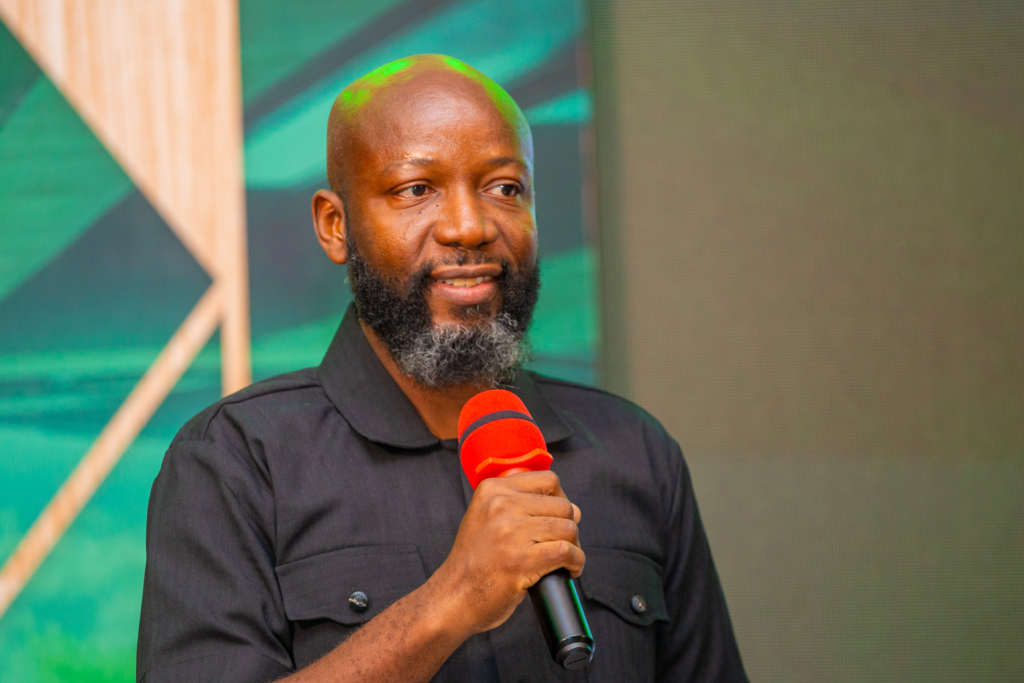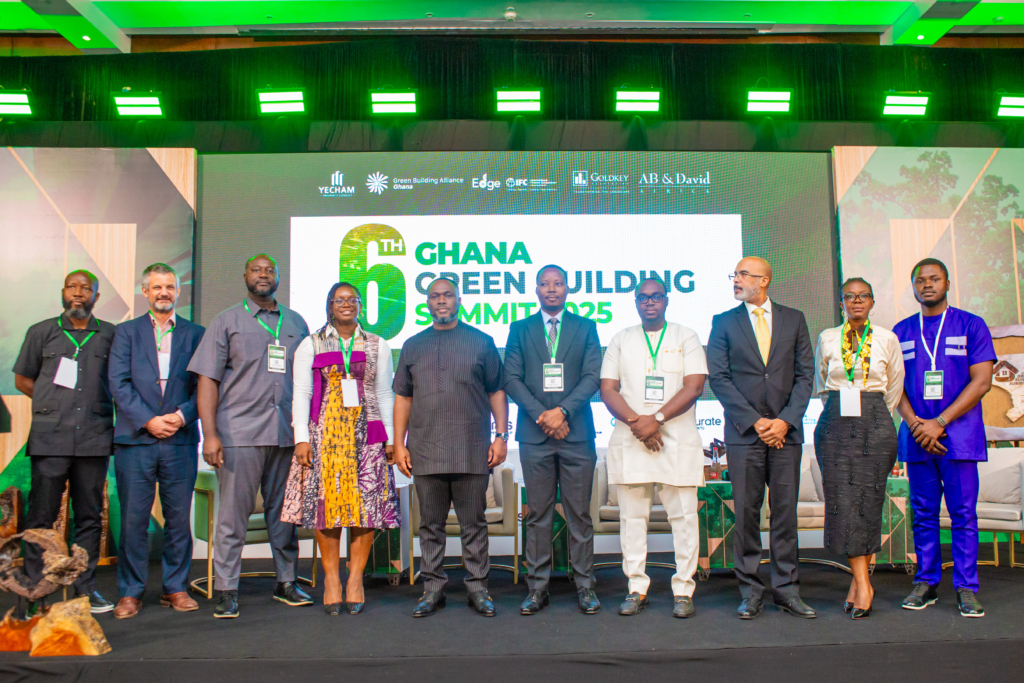Dignitaries and attendees in a group photograph at the 6th Ghana Green Building Summit
The 6th Ghana Green Building Summit was successfully held in Accra, bringing together more than 300 stakeholders from government, development institutions, academia, the private sector, and civil society to deliberate on the critical role of sustainable buildings in shaping Ghana’s future.
Under the theme ‘Reimagining Buildings and Cities for Economic and Social Prosperity’, the Summit provided a robust platform for dialogue, innovation, and collaboration. The overarching message was clear and emphatic: sustainable buildings are not a luxury reserved for the elite; they can and must be affordable.
Convened by Cyril Nii Ayitey Tetteh, the Summit reinforced the idea that sustainability is fundamentally about longevity, resilience, and inclusion. “Sustainability is all about continuity. This happens when we embed sustainability into business, adopt processes with ESG frameworks and practise sustainable banking principles,” he noted in his welcome address.
Government commitment to sustainable housing
Delivering the keynote speeches, the Minister for Works, Housing and Water Resources, Hon. Kenneth Gilbert Adjei, affirmed the government’s determination to make green building practices central to national development policies. “We are actively integrating green building principles into our national housing strategies and programmes,” he stated.
Hon. Adjei highlighted the District Housing Programme as a key initiative aimed at delivering sustainable, affordable homes in rural and peri-urban areas using environmentally responsible, locally sourced materials. “Affordable—in quotes—because what is affordable to me may not be affordable to you,” he added, acknowledging the fluid definitions around affordability. He further also emphasised the need for green finance to unlock scale and accessibility.

Climate policy and strategic coordination
The Minister of State for Climate Change and Sustainability, Hon. Issifu Seidu outlined Ghana’s broader climate response strategy.
In a speech read on his behalf by Cedric Dzelu – Technical Director to the Minister of State in charge of Climate Change and Sustainabilty, he cited alarming World Bank projections that climate-induced economic losses could triple by 2050, with over 30 million Ghanaians potentially exposed to extreme heat. “Climate change is not a distant threat. It is already impacting livelihoods, infrastructure, food security and the very sustainability of our cities, he said.
He called on builders to design cities not merely with bricks and mortar, but with vision and purpose. “Let us then design cities that breathe. Cities that include. Cities that endure, he noted.
Technical insights and IFC EDGE’s impact
From the International Finance Corporation (IFC), Paul Kwesi Ocran, Green Buildings Lead, Ghana, delivered an in-depth presentation on the technical dimensions of green building in the country. He underscored the affordability of sustainable design and stressed that green homes should not be limited to high-rise luxury developments. “We should not always look at green buildings as three-storey buildings or the iconic ten-storey towers. Your home can also be green,” he said.
Citing examples from Accra and Tamale, Ocran detailed how low-tech design interventions—like reflective roofing and efficient lighting—have resulted in over 30 percent energy and water savings in affordable housing projects.
Public sector innovation and support for young designers
In a compelling contribution, John Sheriff Bawah, Managing Director of State Housing Company Limited (SHCL), reinforced the need to redefine affordability in Ghana’s housing sector. “It ranges from US$60,000 to US$250,000—everybody tags it affordable. That is the key issue,” he stated. Bawah commended the summit for bridging technical expertise with youth innovation.

One such example was Joel Jojo Osam Mensah, winner of the 3rd IFC EDGE Student Design Competition. His design, titled ‘Nɔte Dan’ (Earth House), incorporated natural ventilation, rammed earth walls, and a beehive passive cooling system to achieve over 50 percent savings in energy and water usage. “If you take nothing out of this, know that you have a job with State Housing after this,” Bawah announced, offering a job opportunity to the young designer. A statement which was fully endorsed by the sector Minister.
International and legal perspectives
Yewande Giwa, Senior Operations Officer at IFC, acknowledged the critical support of the Government of the United Kingdom and initial support from the Swiss government, who have been instrumental in promoting green finance instruments and capacity building across Africa. “What if every new building in Ghana met the EDGE standard? The potential for long-term climate impact would be extraordinary,” she said.
Also addressing participants, Vera Owusu-Osei, Partner and Co-Chair of the Green Transition Practice at AB & David Africa, framed the summit as a model for how legal frameworks, investment strategies, and environmental priorities can intersect. “Today’s conversations are a testament to what is possible when innovation, policy, and legal support align,” she said.
From the British High Commission, Richard Sandall, Development Director, emphasised the importance of systems thinking and leadership. “Green buildings are not a luxury. They are a necessity,” he said. He urged stakeholders to think beyond technology and focus on the commercial and political systems that shape value and demand.
Looking ahead
The Summit concluded with a broad coalition of partners now aligned to deliver affordable, inclusive, and sustainable cities—one green home at a time. The 6th Ghana Green Building Summit featured six panel discussions covering diverse aspects of sustainable building and development in Ghana.
Panel One focused on ‘The Business Case for Green Affordable Housing’. Panel Two, designated as a Design Session, explored ‘Reimagining our Public Spaces for efficient operations management, occupant comfort and well-being’. Panel Three, labeled as the Cities Session, addressed ‘Reimagining Our Cities – What are the successful policy frameworks and development models from Africa and abroad which can be adopted for Liveable and Resilient Cities use across Africa’.
Panel Four, designated as the ESG Session, delved into ‘Building a business case for ESG: A C-Suite conversation’. Panel Five, the Finance Session, explored ‘Unlocking Climate Finance for Project Pipeline Development’. Panel Six, the Energy Session, addressed ‘Advancing green infrastructure through innovative design, renewable energy and e-mobility solutions’.
About Ghana Green Building Summit
The annual Ghana Green Building Summit (GGBS), established in 2017, was created to assess Ghana’s green building needs and develop context-specific solutions in design, finance, and policy. Over the course of its past five editions, the summit has featured a wide range of high-profile speakers, including ministers of state, policymakers, and mayors from across Africa. In recognition of its impact, GGBS was named Green Event of the Year at the 2019 Ghana Property Awards.
Throughout its journey, GGBS has partnered with the IFC EDGE program to organize student design competitions and capacity-building workshops for professionals in the built environment. Notable guests at co-curated events have included the First Lady of Ghana and the British High Commissioner, among many others. Initially focused on thought leadership, the summit sparked critical conversations around the opportunities and challenges of developing a green building market in Ghana, with a particular emphasis on advancing Sustainable Development Goals (SDGs) 6, 7, 9, 11, and 13.
Over time, its objectives have broadened to include the development of a green project pipeline, capacity building for youth and women, and the provision of technical and financial support for green innovators and small and medium-sized enterprises (SMEs). In alignment with these expanded goals, the summit is evolving into the Ghana Green Summit, adopting a wider scope that encompasses all aspects of sustainable development and the full sustainability value chain from 2025 and beyond.
DISCLAIMER: The Views, Comments, Opinions, Contributions and Statements made by Readers and Contributors on this platform do not necessarily represent the views or policy of Multimedia Group Limited.



